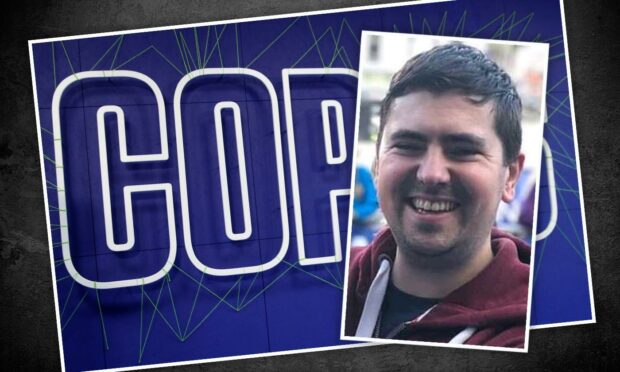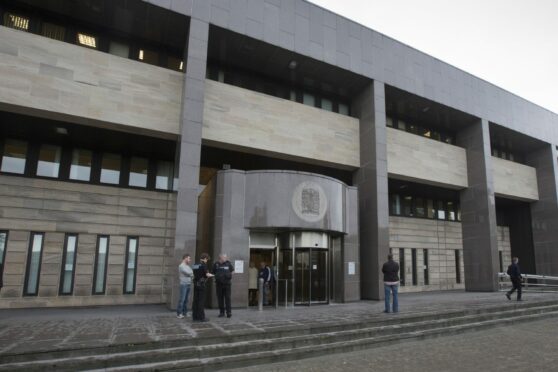The former head of a Scottish Government-funded renewable energy project was found hiding in woods after trying to drive home to Perthshire from a drunken night in Glasgow during the COP26 conference.
Mark Friese, 37, from Auchterarder, abandoned his Renault Clio and went missing after being confronted by an off-duty policeman at 3.30am as he drunkenly tried to perform a u-turn after getting lost and ending up in Bonnybridge, Stirlingshire.
After a manhunt, he was found an hour later in woodland near the M876 and gave himself up.
A court was told Friese had battled his way to university after a disadvantaged life start but the conversation with the off-duty police sergeant had activated PTSD that resulted from seeing someone’s throat slit in front of him when he was a child.
Fled from police
James Moncrieff, prosecuting, said of the November 13 incident: “The off-duty sergeant was returning home when his attention was drawn to the accused’s vehicle.
“It was being driven in a strange manner, moving around the road, the indicator lights were being activated and the vehicle was going straight ahead and it was braking suddenly for no apparent reason.”
Mr Moncrieff said the sergeant suspected the driver had been drinking and began to follow the car, which then turned into Norwood Avenue, Bonnybridge, a dead end beside the M876.
Friese tried to do a u-turn but mounted the kerb and ended up blocking the entrance to a cul-de-sac.
Mr Moncrieff said: “The off-duty sergeant approached and identified himself by showing his warrant card.
“There was a strong smell of alcohol from the accused.”
Other officers were called to the scene but by the time they arrived, Friese had gone.
Hid in woods for an hour
Mr Moncrieff said: “A search was undertaken.
“He was located over an hour later within a wooded area, and was compliant.”
He was taken to Falkirk Police Station and gave a positive breath sample – 71 mics – more than three times the limit.
At Falkirk Sheriff Court, he admitted drink-driving.
Defence solicitor Kris Buchanan said Friese, currently a senior design engineer with Scottish Power, had been out with colleagues in Glasgow on the COP26 weekend.
He had parked his car near High Street Station and had not intended to drive home.
Mr Buchanan said: “His plan had been to stay with one of his colleagues but they became separated.
“He made attempts to find accommodation but there was nothing available and he made the ill-fated decision to drive home.”
Police triggered PTSD
Mr Buchanan said Friese did have a record of “non-analogous” offending but it stopped before he was 20.
He said a psychologist had identified Friese had PTSD issues.
He said: “What these stem from is his upbringing, living in the Dumbarton area.
“During his youth he was witness to a number of traumatic events, witnessing a number of stabbings.
“On one occasion, somebody was slashed in the throat in front of him.
“He grew up in a very difficult environment.
“He was fortunate in that he was smart enough to be able to go to university, gained a degree in electrical engineering and from there he moved away from Dumbarton.
“That is why when he was, effectively, stopped, he went missing for over an hour.”
He said Friese had “clearly demonstrated risk-taking behaviour” but was taking steps to address his issues.
Four-figure fine
Sheriff Alison Michie said Friese had “chosen to drive from Glasgow to Auchterarder while so significantly over the drink-driving limit”.
She said his alcohol reading would “clearly have been considerably higher” had he not gone missing for an hour.
Fining him £1000 and disqualifying him for two years, she said: “You’re clearly educated, you’re a father, and you’re married to a doctor.
“I am sure you cannot fail to appreciate the seriousness of your conduct.
“You have previous convictions but not past the age of 20, so I am prepared to deal with this by way of a financial penalty.”
According to Friese’s Linkedin profile, for over a year from 2014 he was project manager for “Empower Chisitu” Malawi, playing a key role in the development and leadership of a £54,000 Scottish government-funded project to build turbines and bring power to rural villages.










